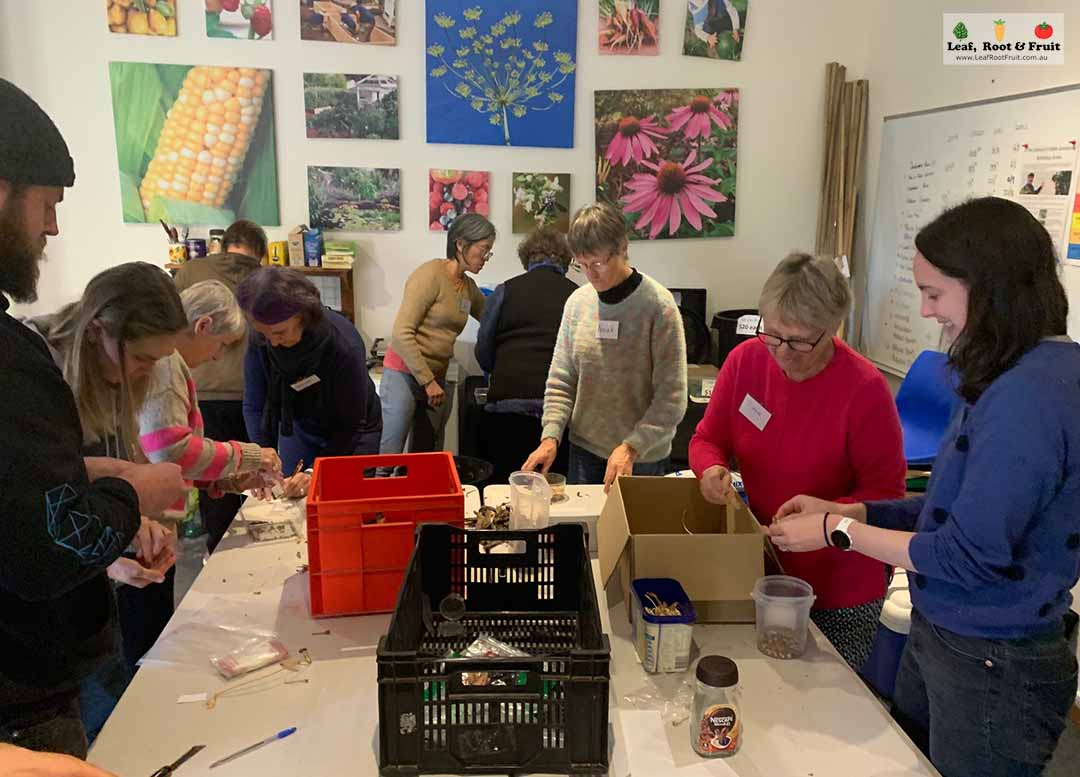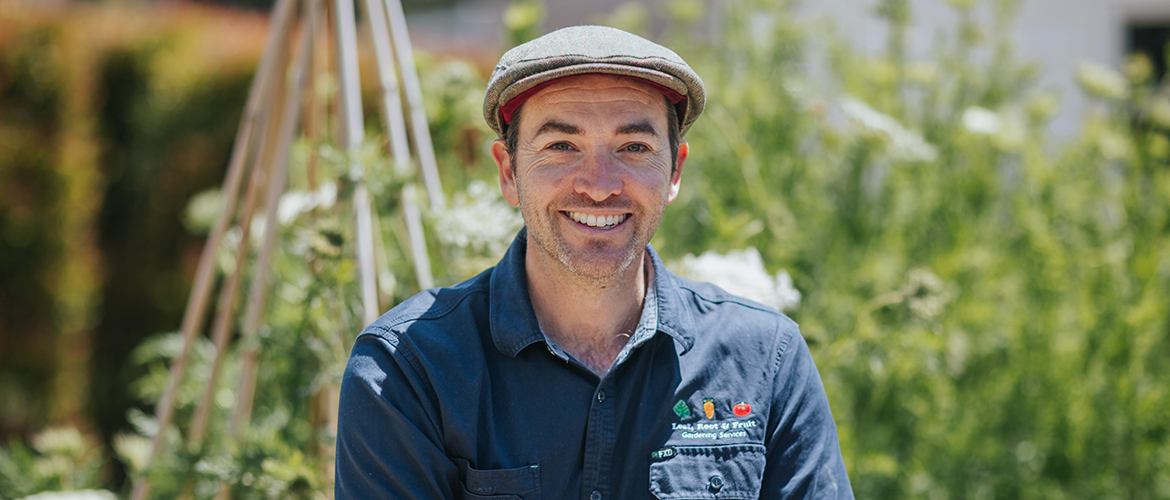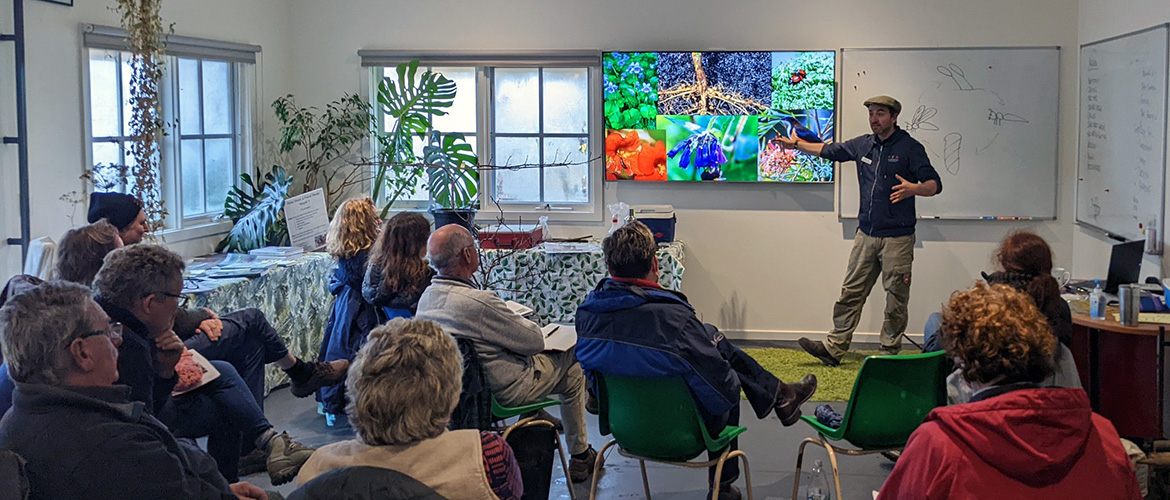Fruit Tree Grafting, Seed Saving and Pollination: Plant Propagation

Plant reproduction is essential to our food production systems. Delve into the world of pollination and understand why some plants need cross pollinators and others are self-fertile. Understand vegetative methods of plant propagation, including different types of cuttings. Learn how to graft fruit trees and how to choose the right rootstock. Explore seed saving, and the difference between hybrid, heirloom and GMO seed.

This workshop in the Science of Edible Gardening series, specifically looks at plant reproduction and how it can influence plant propagation methods. You will come away with the skills and confidence to propagate many different types of plants, as well as save seed for future crops.
Topics:
- Plant Life Cycles
- Fruit Tree Pollination Requirements
- Seed Saving
- Fruit Tree Grafting
- Sowing Seeds
- Propagation via Cuttings
The class involves a combination of theory in a classroom setting, demonstrations and hands-on practical activities including:
- Collecting seed for saving activity
- Demonstration of different pollination techniques (particularly for seed saving)
- Fruit tree grafting
- Striking cuttings and other plant propagation methods
By the end of the class you will have a greater understanding of pollination of flowers and plant reproduction. You will have the confidence to propagate plants using a range of methods.
"Plant variation and genetics was explained really well…. loved the science behind it. Loved the demo of grafting…. seeing it done was fab… great class"
Carol C.
Workshop participant
What to Bring:
- Enthusiasm for learning
- Your lunch
- Water bottle
- Notebook and pen
- Closed toed, practical shoes
- Appropriate Clothing as Kyneton can be cold and wet in autumn.
Participants will be able to take home some samples of saved seed and plant cuttings to strike.
The Science of Edible Gardening workshop series
This event is one in an eight-part series called the Science of Edible Gardening. You can book in for each workshop individually, but most attendees end up completing the entire series. There is no start or finish to the series – the workshops can be completed in any order and don’t need to be completed consecutively. If life gets busy, or you can’t make a particular session, then you can always come to the same session another year.
The series has been designed to give you an overview of how plants grow and interact with the environment. This understanding makes decision making, planning and garden maintenance straightforward. Observation and understanding of natural ecosystems and phenomena can help you to be a more successful and fulfilled gardener.
"Lots of ah-ha moments. I particularly enjoy the scientific framework that informs the workshops. Digestible and relevant information that is easy to apply in the home garden.”
Lynne F.
Workshop participant
The eight workshop topics are:
🧪 Soil Testing and Fertilisers: Growing Nutrient-dense Foods (each March)
🐛 Garden Pests and How to Control Them: Population Ecology (each April)
🌱 Fruit Tree Grafting, Seed Saving and Pollination: Plant Propagation (each May)
✂ Fruit Tree Pruning and Plant Manipulation (each June)
📅 Garden Planning, Seasonality and Timing (each July)
💩 The Art of Compost: Carbon and Nitrogen Cycles (each August)
🌳 Controlling Weeds: Ecological Succession and Soil (each September)
💧 Garden Irrigation, Rainwater Tanks and Sunlight (each November)
More information about the Science of Edible Gardening workshop series can be found here:
https://www.leafrootfruit.com.au/science-of-edible-gardening-workshop-class/
About the facilitator
I’m Duncan Cocking and I’ve been growing fruit and vegetables since I was four years old. I support others to grow food and reconnect with nature through my business Leaf, Root & Fruit. I'm passionate about reconnecting you to nature via gardening. I write about growing food and living sustainably. I'm a cool-temperate gardener and permaculture educator with 10 years of experience hosting workshops.

“Fabulous workshop. You know your material so well and are able to deliver it in easily digestible form. I learned things I didn’t realise I needed to know. I loved having the science explained to counter some of the gardening folklore I’ve accepted without questioning…”
Wendy P.
About the facilities
In 2019 my young family and I moved from Melbourne to make a tree change to Kyneton, a small town 80 km north-west of the city in Victoria, Australia. Since then, I have been busy developing a permaculture-inspired garden ecosystem.
The property has an onsite classroom, with heating supplied by a wood burner. A split system acts as a back-up source of heating and cooling. The light filled, colourful classroom is kitted out with a large screen for running presentations (I promise that these presentations are almost entirely pictures and rarely contain words). The classroom has basic tea and coffee making facilities, ample car parking and a dedicated toilet.

My demonstration orchard contained within a netted enclosure provides opportunities for workshop participants to explore all aspects of growing fruit trees, and contains many examples of espaliered trees. I have designed and planted an extensive berry patch, market garden beds and edible forest gardens. The kitchen garden demonstrates food growing in a more typical backyard setting.
Participants from all over the state attend our workshops. I look forward to hosting you at this exciting event.
Facilitators
Duncan Cocking
Contact us
- Duncan Cocking
- in••••o@lea••••t.com.au
- 0423003764
Location
Classifications
Categories
- General
Age Groups
- All
Levels
- All